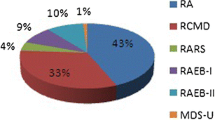Abstract
The aim of this study was to assess the possible influence of genetic polymorphisms in hOGG1, XRCC1, XRCC3, XPD, XPG and APE1 on the observed DNA damage in a group of Turkish myelodysplastic syndrome (MDS) patients. A total of 39 patients with myelodysplastic syndrome and 78 age-matched healthy control subjects were included in our study. Polymerase chain reaction/restriction fragment length polymorphism analysis was performed for the detection of DNA repair gene variants. No significant differences in DNA repair enzymes APE1, XRCC1 and XPG were found between MDS patients and controls. On the other hand, XRCC3, XPD and hOGG1 were associated with an increased risk of MDS (p = 0.004, p = 0.000, p = 0.017, respectively). Specifically, Thr/Met genotype was more relevant in patients (p = 0.026) in XRCC3; in hOGG1, Cys+ genotype was found higher in patients (p = 0.017); and in XPD, Gln/Gln genotypes were found higher in the patient (p = 0.001). In conclusion, XRCC3, XPD and hOGG1 genotypes are associated with an increased MDS risk, suggesting their possible involvement in the pathogenesis and biology of this disease.
Similar content being viewed by others
References
Sterpone S, Cozzi R. Influence of XRCC1 genetic polymorphisms on ionizing radiation-induced DNA damage and repair. J Nucleic Acids. 2010;25:2010.
Altieri F, Grillo C, Maceroni M, Chichiarelli S. DNA damage and repair: from molecular mechanisms to health implications. Antioxid Redox Signal. 2008;10:891–937.
Iarmarcovai G, Bonassi S, Botta A, Baan RA, Orsière T. Genetic polymorphisms and micronucleus formation: a review of the literature. Mutat Res. 2008;658:215–33.
Tanrikulu S, Doğru-Abbasoğlu S, Ozderya A, et al. The 8-oxoguanine DNA N-glycosylase 1 (hOGG1) Ser326Cys variant affects the susceptibility to Graves’ disease. Cell Biochem Funct. 2011;29:244–8.
Masson JY, Tarsounas MC, Stasiak AZ, et al. Identification and purification of two distinct complexes containing the five RAD51 paralogs. Genes Dev. 2001;15:3296–307.
Lunn RM, Helzlsouer KJ, Parshad R, et al. XPD polymorphisms: effects on DNA repair proficiency. Carcinogenesis. 2000;21:551–5.
Friedberg EC, Bond JP, Burns DK, et al. Defective nucleotide excision repair in xpc mutant mice and its association with cancer predisposition. Mutat Res. 2000;459:99–108.
Tefferi A, Vardiman JW. Myelodysplastic syndromes. N Engl J Med. 2009;361:1872–85.
Willman CL. Molecular genetic features of myelodysplastic syndromes (MDS). Leukemia. 1998;12:S2–6.
Shin A, Lee KM, Ahn B, et al. Genotype-phenotype relationship between DNA repair gene genetic polymorphisms and DNA repair capacity. Asian Pac J Cancer Prev. 2008;9:501–5.
Fabiani E, D’Alò F, Scardocci A, et al. Polymorphisms of detoxification and DNA repair enzymes in myelodysplastic syndromes. Leuk Res. 2009;33:1068–71.
Tefferi A, Vardiman JV. Myelodysplastic syndromes. N Engl J Med. 2009;361:1872–85.
Warlick ED, Smith BD. Myelodysplastic syndromes: review of pathophysiology and current novel treatment approaches. Curr Cancer Drug Targets. 2007;7:541–58.
Chen H, Sandler DP, Taylor JA, et al. Increased risk for myelodysplastic syndromes in individuals with glutathione transferase theta 1 (GSTT1) gene defect. Lancet. 1996;347:295–7.
Sasai Y, Horiike S, Misawa S, et al. Genotype of glutathione S-transferase and other genetic configurations in myelodysplasia. Leuk Res. 1999;23:975–81.
Tsabouri SE, Georgiou I, Alamanos I, Bourantas KL. Increased prevalence of GSTM(1) null genotype in patients with myelodysplastic syndrome: a case–control study. Acta Haematol. 2000;104:169–73.
Broberg K, Höglund M, Gustafsson C, et al. Genetic variant of the human homologous recombination-associated gene RMI1 (S455N) impacts the risk of AML/MDS and malignant melanoma. Cancer Lett. 2007;258:38–44.
Belickova M, Merkerova MD, Stara E, et al. DNA repair gene variants are associated with an increased risk of myelodysplastic syndromes in a Czech population. J Hematol Oncol. 2013;6:9.
Allan JM, Smith AG, Wheatley K, et al. Genetic variation in XPD predicts treatment outcome and risk of acute myeloid leukemia following chemotherapy. Blood. 2004;104:3872–7.
Voso MT, Hohaus S, Guidi F, et al. Prognostic role of glutathione S-transferase polymorphisms in acute myeloid leukemia. Leukemia. 2008;22:1685–91.
Voso MT, D’Alo’ F, Putzulu R, et al. Negative prognostic value of glutathione S-transferase (GSTM1 and GSTT1) deletions in adult acute myeloid leukemia. Blood. 2002;100:2703–7.
Griffin CS, Simpson PJ, Wilson CR, Thacker J. Mammalian recombination-repair genes XRCC2 and XRCC3 promote correct chromosome segregation. Nat Cell Biol. 2000;2:757–61.
Cui X, Brenneman M, Meyne J, Oshimura M, Goodwin EH, Chen DJ. The XRCC2 and XRCC3 repair genes are required for chromosome stability in mammalian cells. Mutat Res. 1999;434:75–88.
Matullo G, Palli D, Peluso M, et al. XRCC1, XRCC3, XPD gene polymorphisms, smoking and (32)P-DNA adducts in a sample of healthy subjects. Carcinogenesis. 2001;22:1437–45.
Costa RM, Chiganças V, Galhardo Rda S, Carvalho H, Menck CF. The eukaryotic nucleotide excision repair pathway. Biochimie. 2003;85:1083–99.
Coppedè F, Mancuso M, Lo Gerfo A, et al. A Ser326Cys polymorphism in the DNA repair gene hOGG1 is not associated with sporadic Alzheimer’s disease. Neurosci Lett. 2007;414:282–5.
Acknowledgments
Istanbul Haseki Training and Research Hospital financially supported the study.
Conflict of interests
The authors declare no competing interest.
Author information
Authors and Affiliations
Corresponding author
Rights and permissions
About this article
Cite this article
Aktuglu, M.B., Ayer, M., Bireller, E.S. et al. Investigation of DNA repair gene variants on myelodysplastic syndromes in a Turkish population. Med Oncol 31, 174 (2014). https://doi.org/10.1007/s12032-014-0174-6
Received:
Accepted:
Published:
DOI: https://doi.org/10.1007/s12032-014-0174-6




